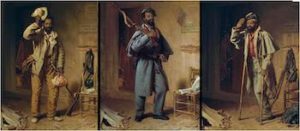
Frank Baker, Shepard Mallory, and James Townsend
*Confederate slave contraband and the American Civil War are affirmed on this date in 1861. On that date, Frank Baker, Shepard Mallory, and James Townsend, Black field hands owned by Charles Mallory, rowed across the James River in Virginia and claimed asylum in a Union-held citadel.
Fort Monroe, Va., a fishhook-shaped spit of land near the mouth of the Chesapeake Bay, had been a military post since the first Jamestown settlers. This spot where the slaves took refuge was also, in 1619, where a Dutch ship landed with some 20 African captives for the fledgling Virginia Colony. Two and a half centuries later, in the first spring of the Civil War, Fort Monroe was a lonely Union redoubt in the heart of newly Confederate territory. Its defenders stood on constant guard. Frigates and armed steamers crowded the nearby waters known as Hampton Roads, one of the world’s great natural harbors.
Perspiring squads of soldiers hauled giant Columbiad cannons from the fort’s wharf up to its stone parapets. Yet history would come to Fort Monroe under darkness in a stolen boat crewed by Baker, Mallory, and Townsend. Hundreds of local slaves had been pressed into service by the Confederates, compelled to build an artillery emplacement amid the dunes across the harbor. They labored beneath the banner of the 115th Virginia Militia, a blue flag bearing a motto in golden letters: “Give me liberty or give me death.” The slaves offered intelligence about rebel fortifications and, by seeking refuge, prompted Butler to come up with the novel legal theory that these escaped slaves were contraband of war and did not have to be returned to their owners.
The trio's bold move prompted a flood of escaping slaves to follow in their footsteps, establishing Fort Monroe as an early outpost of freedom well before President Abraham Lincoln issued the Emancipation Proclamation.